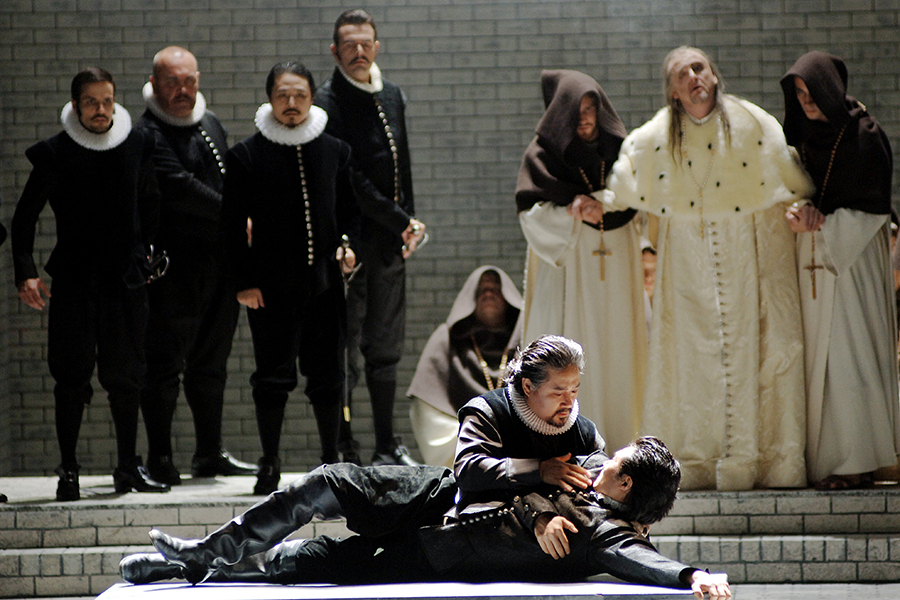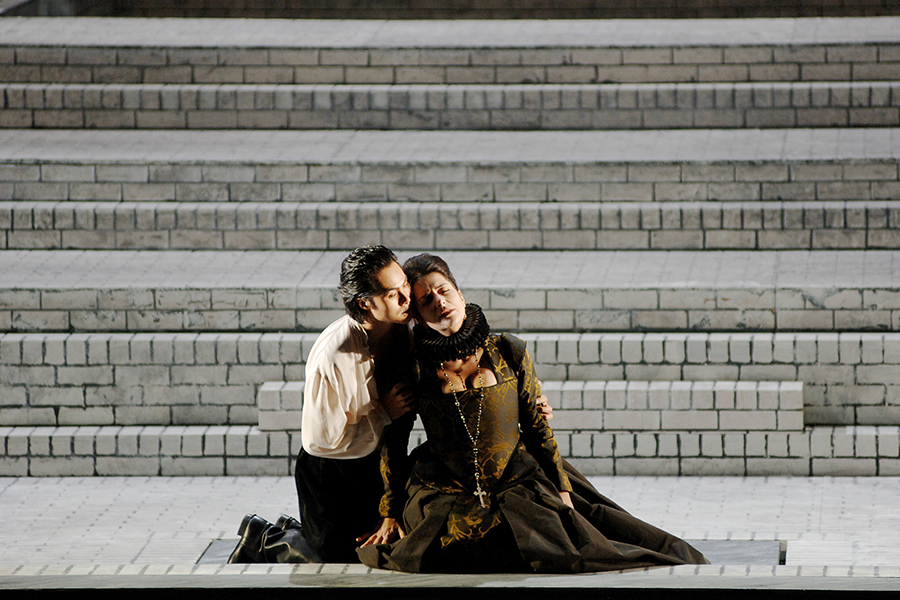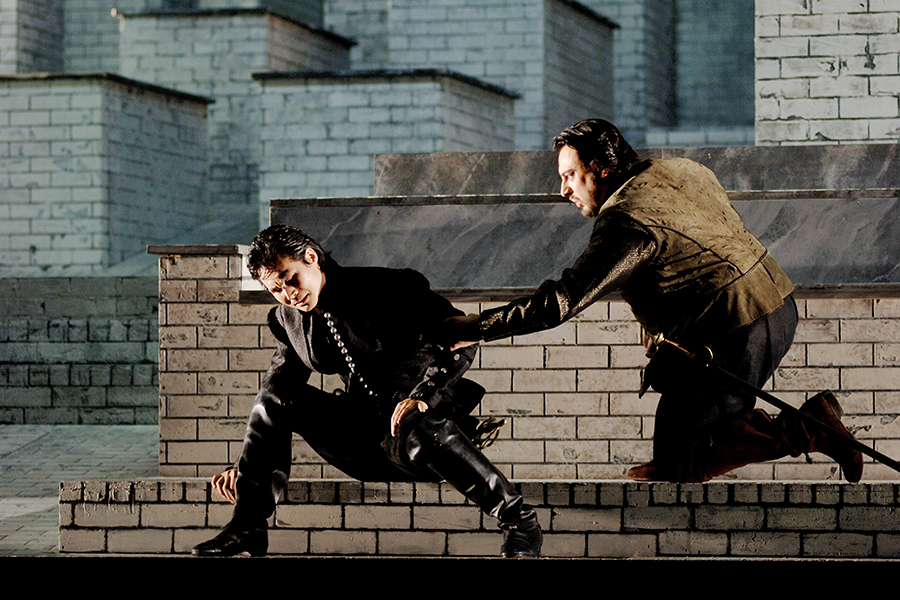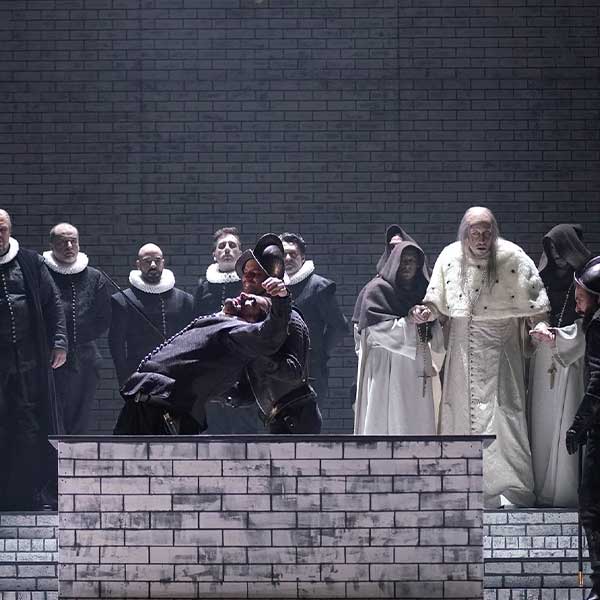October 19, 2022
Don Carlos: Liberty or the Inquisition?
Republics sometimes die by conquest from without. But they also die by collapse from within. Unlike monarchies, which can maintain order simply through fear and obedience, republics need their citizens to be actively engaged, and this will not happen unless people love the institutions in which they live and are willing to sacrifice — sometimes only time, sometimes life itself — for the ideals that these institutions embody.
Can this new headless form of government depend on people to do the job? Or will weak-willed human beings give way to fear and yield their freedom to an authoritarian leader — whether religious or secular? This question was much debated in the 18th century, when Friedrich Schiller made it central to his drama Don Carlos (1787), and it was still debated when Verdi — drawing on Schiller, but also on his own passionate involvement in the Risorgimento (a movement for Italian unity and republican self-government) — wrote his opera Don Carlos (1867).
This same question stares us in the face today, as some nations fight to remain free republics and others give up their freedom to autocrats and zealots. Don Carlos is urgent for our time. What emotions does the republican cause need to inspire? And what does it need to beware of?
In grappling with this question, opera has a major advantage over straight drama. (Consider, in Julius Caesar, how hard it is even for Shakespeare to depict the key role of the people, as they waver in their loyalties.) In opera, the chorus can be a key actor, and can be divided, plural, wavering, ecstatic — whatever the composer needs. Verdi is opera's great master of choral writing. In Don Carlos he uses that mastery to represent political emotions that Schiller has no way of depicting — especially in the auto-da-fé scene where the mob, inspired by religious fear and hatred, ignores Carlos's call for Flemish freedom, arrests Carlos and the Flemish deputies, and consigns a group of heretics to the flames. All in all, Don Carlos is among our most profound operas about political emotions.

The frail yet powerful Grand Inquisitor looms over Philippe and Don Carlos.
If republics are to survive, they also need to ponder the emotions of individuals and their relationship to the public cause — a problem as old as the civil wars depicted in Greek tragedy and one that opera, with its deep probing of the inner world, is also well equipped to depict. Sometimes personal relationships support the public cause, but often they are in tension with it. Schiller's drama contains many long speeches on this theme, but Verdi's opera, with its remarkable compression of ideas, gets to the heart of the issue; Carlos and Rodrigue share a passionate love of liberty that burns, they say, like a flame (in the duet "God, you sow in our spirits a ray of the same fire") and animates their friendship. But later, when Rodrigue, doing Philippe's bidding, asks Carlos to surrender his sword, drawn for the sake of that same republican cause, we hear the liberty theme recurring ironically in the background.
Every major character in the opera save one faces a tragic conflict between personal love and political duties, and Verdi illuminates these conflicts with unparalleled subtlety, as Philippe (much more complicated and genuinely tragic than in Schiller) wavers between love of his wife and the needs of state, and between love of Rodrigue and the Inquisitor's command to surrender him. Carlos, Rodrigue, Eboli, and Elisabeth all, similarly, grapple with conflicts between public duty and private passion and between multiple loves.
The only character who is free from conflict is the Inquisitor, who insists (in Schiller, though the same absence of human recognition is in the music Verdi writes for him) that people do not matter as individuals — "Mankind is numbers, Nothing but numbers" — and whose only goal is increasing the power of the Inquisition. Don Carlos is a long opera because of the number of complex characters it contains and whose conflicts it probes, but where Schiller often feels tedious and wordy, the opera is always taut and throbbing with masterfully delineated passion.
"This opera was born in fire and flames," wrote Verdi. And indeed its time was a dark one in Italian politics, in which the future of republican self-government was on the line and the menacing hand of church authority felt everywhere. Verdi had long been a central figure in the Risorgimento (not a radical republican like Garibaldi and Mazzini, but more of a pragmatist like Cavour, willing to accept a constitutional monarchy) and utterly devoted to Italian unification and self-determination. From early on, his operas allude to the liberation movement, especially in The Battle of Legnano (1849). Verdi was elected in 1859 as a member of the new provincial council, but declined the office. By this time he was openly identified with the nationalist cause, and "Viva Verdi" was used as an acronymic code for Viva Victor Emanuele Re D'Italia (the liberal king who sought a constitutional monarchy). In 1861, Verdi was finally convinced to stand for office in the Chamber of Deputies, agreeing on the condition that he would resign shortly after.
Self-government had powerful enemies, in particular Pope Pius IX (1792-1878), who became pope in 1848, and was 75 when Don Carlos premiered. Initially sympathetic to the Risorgimento, he changed course and adopted an extreme conservative and church authoritarian posture. In 1864 he issued a "Syllabus of Errors," an attack on all forms of liberalism, religious toleration, personal autonomy, and national self-determination which still makes chilling reading. He reversed the religious toleration laws of the Republic and reinstituted the Jewish ghetto, which he had previously opened. He also masterminded the notorious kidnapping of Edgardo Mortara, a boy taken by force from his Jewish home at the age of six, when a former servant said that she had baptized him during a time of illness. (This kidnapping has been defended only recently by a conservative legal scholar at Harvard University, with appeal to religious authority!) Verdi clearly saw the Catholic Church as a major foe of republican freedom. In 1866 he wrote to a friend that if war broke out he would be "the first target—not of the Germans but of the priests." And war indeed threatened.

Carlos and Elisabeth wrestle with their private passions.
It was at this fraught time, in 1864, that Verdi was invited to Paris to compose a work for the Paris Opéra. He agreed, and after considering several other ideas — including King Lear, which he rejected as lacking spectacle — he turned to Schiller's play, marking the fourth time (after Giovanna D'Arco (1845), I Masnadieri (1847) and Luisa Miller (1849)) he had turned to the German poet. He worked closely with librettists Camille Du Locle and Joseph Méry, insisting on keeping two scenes from Schiller to which he was especially attached: the scene between Philippe and Rodrigue, with its passionate argument for freedom of speech and belief, and the pivotal scene between Philippe and the Grand Inquisitor. (The librettists complied in a masterfully compressed manner.) Verdi explicitly stipulated that the Inquisitor be "blind and very, very old." He also asked for additions, especially the auto-da-fé scene, which satisfied his taste for spectacle, and also made an emphatic statement about the danger of fearful obedience to religious authority.
Meanwhile, war broke out: Prussia and Italy on one side, Austria and France on the other. Verdi felt great guilt at being away from Italy at this time, writing as he prepared to return, reluctantly, to Paris that he was "ashamed to keep myself busy with notes in these difficult and anguish-laden moments." And, in another letter, "I would have tried hard, I would have done whatever small good I could, and I would have enjoyed it and suffered with my own people." He tried to get out of his contract twice, and was refused, and eventually decided that he must stay in order to avoid costly litigation. The war, as it turned out, was over quickly, and Italy was on the winning side, gaining control over Venice and Venetia under the Treaty of Vienna — thus the Austro-Prussian War is also known as the Third Italian War of Independence.
Rehearsals began, but Verdi's mood, briefly lightened by political events, darkened again with the death of his father, Carlo, in January 1867, which provoked a prolonged depression. But after avoiding rehearsals for a month, Verdi returned, preparing the work for its much-delayed March 11 premiere. Because of the rigid Paris schedule (no earlier than 7 PM, no later than midnight because of the last train to the suburbs), he had to make last-minute cuts of 15 minutes, including an opening scene in which Elisabeth is asked for help by suffering woodcutters, and a duet between Philippe and Carlos after the death of Rodrigue. (These scenes exist and are occasionally restored, but they will not be performed in Lyric's production.)
Throughout the opera's multinational history, Verdi made many changes and cuts, so there are many authentic versions, one of which — the five-act revision created for Modena in 1886 — Lyric is performing. One thing Verdi never did, however, was write Italian words or compose for an Italian text. Others translated the libretto, and he did not protest, but it is clear that the music is written for the French text, and is best performed in that language.

Rodrigue (at right) implores Don Carlos to take action.
Given its history, it is no surprise that Don Carlos contains trenchant and unforgettable depictions of religious imperialism and human weakness, as the crowd prefers religious fear to the call of liberty, and as Philippe surrenders Rodrigue to the Inquisitor out of personal guilt and fear. But, equally characteristic of its composer, it also contains sympathetic and even merciful depictions of human torment and frailty, in Philippe, Rodrigue, and Eboli. Only the Inquisitor receives no mercy from Verdi's capacious humanism, because he is the only character unmoved by human love.
Schiller's play ends abruptly, as Philippe, turning Carlos over to the Inquisitor, says, "Cardinal, I have done my part. Now do yours." Verdi's ending is far more mysterious: A monk who may or may not be Charles V (who is supposed to have died years earlier) appears and apparently saves Carlos from the Inquisition — but only by drawing him into the monastery. This ending does incorporate some of the spectacle that Verdi so loved, but it has been found deeply unsatisfactory by many: Is it darker or less dark? What really becomes of Carlos and his cause? The audience is invited to ponder this puzzle. I myself find Verdi's invitation to ponder liberating rather than unsatisfactory.
In one way, Verdi's ending is darker than Schiller's: The playwright repeatedly signposts the Enlightenment to come, telling his audience that they can look back on these grim events from the position of victors in the struggle for republican freedom. In the opera, Carlos does make a desperate guess that the power of the Inquisition will be broken by God, but the murky ending undermines the authority of his prediction. Here, I think, Verdi sees more deeply than Schiller: The struggle for free speech and freedom is perpetual, and it must be fought in the heart and mind of every person who loves self-government, in every generation—as love of liberty contends with superstition and fear of power. We cannot wait for God, or even history, to deal with our tyrants. Italy's future was precarious in the 1860's—with Pius IX lurching from liberalism to dark anti-rationalism—just as ours is today, with threats against democracy from the forces of anti-truth, and with a public culture tainted by fear of other groups and people. The ending of Don Carlos is as dark or "light" as we make it in our lives.
There is, still, one aspect of the opera that gives us reason for optimism about the world, and republican projects in it—the personality of its creator, which suffuses the entire work with his zeal for liberty, his compassion, his unquenchable joy. "To the world, as to the nation he helped to found, he left an enduring legacy of music, charity, patriotism, honour, grace, and reason," concludes Verdi biographer Mary Jane Phillips-Matz. "He was and remains a mighty force for continuing good."
Martha C. Nussbaum is the Ernst Freund Distinguished Service Professor of Law and Ethics at the University of Chicago, appointed in the Law School and the Philosophy Department. She is the author, among other books, of The Monarchy of Fear (2018) and Political Emotions (2013).
Acknowledged by audiences and critics alike as one of the most magnificent achievements in the history of opera, Don Carlos masterfully reveals the private turmoil of very public personalities. In 16th-century Spain, King Philip II is torn apart by his own jealous suspicions that his son, crown prince Carlos, and Queen Elisabeth — Philip’s young wife and Carlos’s stepmother — are in love. The drama unfolds and washes over you with unforgettable intensity and thrilling musical splendor. The full stature of this epic opera will be revealed at Lyric as never before when performed in the full five acts, with the matchless eloquence of the opera’s original French text. Don Carlos is a tour-de-force experience for those who love Verdi in his prime.
Acknowledged by audiences and critics alike as one of the most magnificent achievements in the history of opera, Don Carlos masterfully reveals the private turmoil of very public personalities. In 16th-century Spain, King Philip II is torn apart by his own jealous suspicions that his son, crown prince Carlos, and Queen Elisabeth — Philip’s young wife and Carlos’s stepmother — are in love. The drama unfolds and washes over you with unforgettable intensity and thrilling musical splendor. The full stature of this epic opera will be revealed at Lyric as never before when performed in the full five acts, with the matchless eloquence of the opera’s original French text. Don Carlos is a tour-de-force experience for those who love Verdi in his prime.
November 9 - November 25, 2022
Don Carlos
Don Carlos
Acknowledged by audiences and critics alike as one of the most magnificent achievements in the history of opera, Don Carlos masterfully reveals the private turmoil of very public personalities. In 16th-century Spain, King Philip II is torn apart by his own jealous suspicions that his son, crown prince Carlos, and Queen Elisabeth — Philip’s young wife and Carlos’s stepmother — are in love. The drama unfolds and washes over you with unforgettable intensity and thrilling musical splendor. The full stature of this epic opera will be revealed at Lyric as never before when performed in the full five acts, with the matchless eloquence of the opera’s original French text. Don Carlos is a tour-de-force experience for those who love Verdi in his prime.

